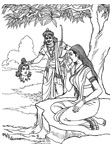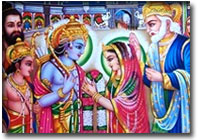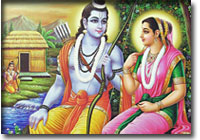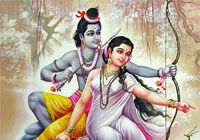THE BRIDAL OF SITA
 |

The women of Kosala were fair and beautiful in their graceful garments. On their arms were bracelets and their ears were full of earrings of gold and gems. Saffron and sandal paste was on their foreheads, flowers were in their hair, and on their necks were ornaments of gold. Every wife was loving and faithful to her husband and in every home there was true devotion. Neighbours lived in kindness side by side, fitful to their rites and scriptures. The people went about their work in honest duty and no one questioned the will of heaven. The men of Kosala were strong and upright, free from impure thoughts or the greed of gold. Each man lived a long and a peaceful life with his sons and grandsons and his loved and honoured wife, and the people prospered in peace.
Under the wise rule of Dasaratha the city of Ayodhya was well- guarded. The soldiers were strong and brave and they never turned back in battle. Their horses had come from Sindhu's rocky land and they were like Indra's horses in their speed. The elephants had come from the Vindhya mountains and from the far Himalayan forests. They were as great and strong as the mighty tuskers of the gods. Under the lofty arches of her streets the people went to and fro about their business, while king Dasaratha lived in the palace with his beloved family. The first born son of the king was Rama, true and righteous, whose mother was the virtuous Queen Kausalya. His second son was Bharatha, rich in earning, born of Queen Kaikeyi. Later, Queen Sumithra bore the bold twins Lakshmana and Sathughna, so that there were four brave princes to serve their father in the city of Ayodhya in the happy days of old. The fame of king Dasaratha and the land of Kosala spread far and wide throughout the world.

'This is the bow, Rudra,' said the king. 'This is the mighty bow of Videha, prized by my fathers from age to age. Many men have tried in vain to string the weapon and to send forth its shinning arrows. My word has gone forth that he who can bend his mighty bow shall wed my daughter Sita.' Rama spoke humbly .' 'Let me touch the bow, O Janaka. Let me lift and bend the weapon, O King of Videha!' 'Be it so,' said the king as the warriors and chiefs were in silence. Rama prayed for strength. With a warrior's might he lifted the bow high before the eyes of Janaka and his lords and people. Proudly he strung the bow of Rudra and drew the cord with resistless force. There was a loud snap and the weapon broke into two. Then Janaka spoke with royal grace. 'Now my old eyes have seen a wonderous deed. Rama, the son of Dasaratha, has shown a strength greater than any we have seen. By his valour and his virtue he has won my daughter Sita and she shall be his faithful wife. O royal sage, send my greetings to King Dasaratha. Tell him of Raama's glorious deed and of his worthy prize! The princes shall stay safe within our walls until their father comes to share in the rejoicing. Send the messengers in my chariot with all haste!'

For some time Dasaratha and his four sons stayed in Mithila while preparations for the marriage were being made. Then came the day when he was to give his gifts of gold and jewels and cattle. The next morning dawned brightly as Rama and his brothers went to the place of offering. As the princes stood by their father, in their fine garments ornamented with jewels, Vasistha spoke to King Janaka in these words: 'Dasaratha waits with his proud and princely sons. Each sacred word is said and each sacred rite is done. Fulfil your promise, O King, and let the wedding now take place.' The sound of the sacred mantras was heard. Softly came the bride Sita, and into the sacred circle came Rama, tall in his manly strength. Janaka placed his beautiful daughter facing Rama and the wedding took place. Men and gods shared their wishes as Janaka sprinkled holy water on the wedded pair. Similarly the wedding of Lakshmana to Urmila, Bharatha to Mandavi and finally Satughana to Srutakirti took place with great pomp. Then while the four princes held their maidens by the hand, the holy priest Vasistha spoke the mantra. Each bride and bridegroom moved round the altar's lighted fire. Three times round the altar did each prince lead his bride and then the wedding rites were ended. After the festivity was over, Dasaratha led his grand procession back to Ayodhya with his newly wedded sons. The people waved their hands and shouted in glad greeting as King Dasaratha entered his palace with the princes and their brides. Months of joy and years of gladness passed. Sita like the Queen of beauty grew in grace and loveliness, and Rama dwelt in Sita's loving heart as closely as Vishnu and his consort dwell together in the skies.

